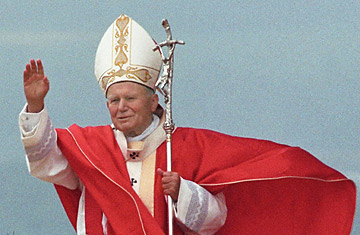
Pope John Paul II waves to a crowd in Gniezno, Poland, during a visit to his native country in 1997
(2 of 8)
It is difficult to imagine a more perfect economy of drama. The Pope's deed spoke, not his words, and it spoke with the full authority of his mortal life and the danger to which Agca had subjected it. The meaning of John Paul's forgiveness was profoundly Christian. He embraced his enemy and pardoned him.
All during the past year, the 1,950th anniversary of Christ's death and hence of the Christian redemption, John Paul has preached the theme of reconciliation. The visit to Agca was his culminating gesture on the theme. The sermon that he preached with his visit to Rebibbia was an elaboration of what he had said in a town near Northern Ireland's border with Eire in 1979: "Violence is evil. Violence is unacceptable as a solution to problems.
Violence is unworthy of man. Violence is a lie, for it goes against the truth of our faith, the truth of our humanity."
John Paul meant, among other things, to demonstrate how the private and public dimensions of human activity may fuse in moral action. What he intended to show was a fundamental relationship between peace and the hearts of men and women, the crucial relevance of the turnings of the will and spirit. Seeing the largest possible meanings in the most intimate places of the soul, John Paul wanted to proclaim that great issues are determined, or at least informed, by the elemental impulses of the human breast—hatred or love. Wrote the Milan-based Catholic daily Avvenire last week: "In the midst of so many voices raised to ask for negotiations between the superpowers on the basis of pure equ ililibrium of strength, in the choir of pacifism which proclaims that only peace counts, all else is relative... a Pope has the courage to utter the ancient word—the responsibility for each evil rests in man as a sinner. There will be no escape from wars, from hunger, from misery, from racial discrimination, from denial of human rights, and not even from missiles, if our hearts are not changed." Said Italian Writer Carlo Bo: "The Pope intends to say, If we really want peace, we must make the first step, we must forget offenses and offer the bread of love and charity.' " The visit to Agca did not come as a surprise. It had been rumored for at least two weeks that John Paul intended to see his attacker during a Christmas-season visit to the more than 2,000 inmates of Rebibbia, on the northeastern outskirts of Rome.
Since his conviction on July 22,1981, Agca has been serving part of a life sentence in the prison's maximum-security wing. When the Pope arrived in his cell, Agca was dressed in a blue crew-neck sweater, jeans and blue-and-white running shoes from which the laces had been removed. He was unshaved. Agca kissed John Paul's hand. "Do you speak Italian?" the Pope asked. Agca nodded. The two men seated themselves, close together, on molded-plastic chairs in a corner of the cell, out of earshot. At times it looked almost as if the Pope were hearing the confession of Agca, a Turkish Muslim. At those moments, John Paul leaned forward from the waist in a priestly posture, his head bowed and forehead tightly clasped in his hand as the younger man spoke.
